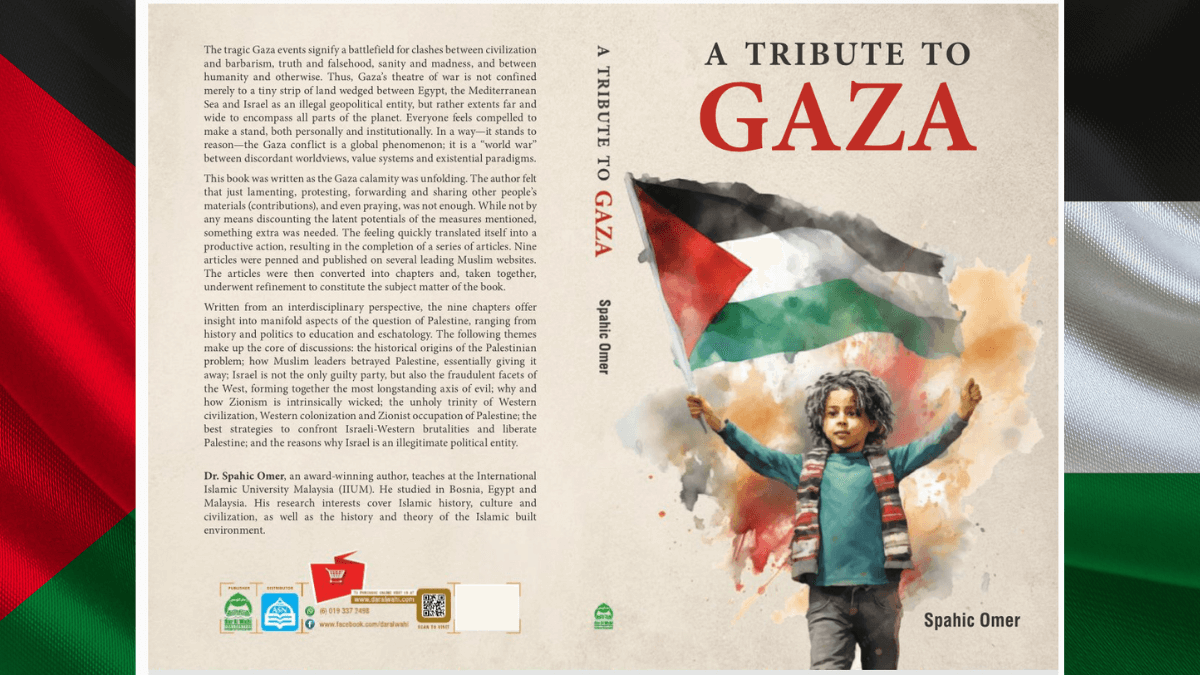For the Love of Palestine

This article is an excerpt from the author’s forthcoming book titled “For the Love of Palestine”, serving as a sequel to the previous book, "A Tribute to Gaza". The new book presents a deeper understanding of the Gaza tragedy and the Palestinian issue as a whole.
For the Love of Palestine, offers an intellectual, moral and spiritual – rather than a sheer emotional - response to the grave crimes against humanity in Gaza committed by the Zionist state of Israel and its Western benefactors.
Despite the situation in Gaza quickly becoming a genocide, it is disheartening that the majority of the institutionalized Western world continues to turn a blind eye to the unfolding tragedy. Without even trying to distinguish between the oppressors and the oppressed, and the violators of all conventions, all goodness and all constitutional as well as human rights and their innocent victims, the West keeps demonstrating its true colours.
With the last masks falling off, the West and its civilizational prospects are indeed digging themselves into a hole. It is true that Israel is a geopolitical “bastard child” of the West, however, there should be a limit to criminality and evil, regardless of who is who and what may be at stake in the proceedings.
Is it possible that the Western civilization has already proven itself to be a failed experiment and that it is already running on the depleted reserves of morality and righteousness? Is it possible, furthermore, that the West, having arrived at an existential crossroads, is already suffering the consequences of its own shortcomings and is stuck in an endless cycle of dead ends?
The issue of Palestine is a proof that the current world order has lost its bearings. The spirit of West-concocted stereotypes like 'wandering Jews' and 'Jews as aliens' has now caught up with the West itself.
The condition of the Western society has rapidly declined to such an extent that it is unable to impart moral guidance to anyone, including the supposed 'lesser' Jewish community. After the tables have turned, the sudden susceptibility of the West to being labelled as well has greatly impacted it. Those anti-Jewish stereotypes were then allowed to evolve into mercurial Western variants best described as 'disordered Westerners' and 'freaks of Western civilization.'
Without a doubt, chickens always come home to roost (one cannot escape his past, reaping what he sows). What is happening in Gaza nowadays is the result of the combination of the worst aspects of Jewry and the worst aspects of the Western world.
The genocide occurring in Gaza is a complex manifestation of evil. It is a situation where two forms of evil have compounded, with each one reinforcing the other in a complementary manner. While the heroic people of Gaza, and the rest of Palestine, are the immediate victims, the entire world must be on high alert. There is so much evil concentrated in one place, and so much power in the wrong hands, that an escalation can occur at any time and engulf the world in flames.
The situation in Palestine seems to be reaching a critical point. Palestine could denote that imminent end of the road for the Western civilizational pretence, with the historical expanses and depth, and socio-cultural inimitability, of Palestine eventually becoming its necropolis.
What an irony! If Palestine is seen as the locus of the rejection and maltreatment of Prophet ‘Isa (Jesus) - first by the Jews to whom ‘Isa had been sent as a prophet, and second by what later came to be known as Christianity through the continuous manipulations and distortions of the teachings of ‘Isa – the same geographical unit of Palestine is about to signify the site where both the rejectors and manipulators-cum-distorters of ‘Isa’s prophetic legacy will be exposed and defeated.
Things are bound to come full circle, whereby an array of centuries-old deceits and treacheries will come crushing down.
It goes without saying that Palestine is bigger than people and their thought patterns. If the Palestinians can be defeated, Palestine cannot. Even in the face of defeat, Palestine and its people, along with all those who stand in solidarity, will always rise again, as Palestine belongs to the world and we are all a part of it. Its (their) coming back is a matter of when, not if.
What is more, if the earthly dimensions of Palestine can be manipulated, its heavenly identity and purpose cannot. All the accidents and vagaries of this world will come and go, but the substance and value of the heavenly character of Palestine will remain and live on.
Such is the sunnatullah (the way Almighty God created and administers the universe) that in the end, the divine truth and its infinite quality are obligated to prevail, outshining its overzealous, but counterfeit, adversaries. That said, whereas Palestine is itemized as a revered heavenly cause, Israel is seen as a debased and very limited earthly endeavour. One thus can easily foresee the ultimate fate of each of them. That is why the Palestine case edges closer to winning with each passing day, while the Zionist Israel case inches towards its demise.
This book has ten chapters, shedding light on a series of important issues that are directly and indirectly related to the subject of Palestine. A very broad framework of subjects and their burning questions - such as those pertaining to history, theology, morality, socio-cultural studies, travel literature and inter-religious polemics - is covered.
What stands out is the question of the Abrahamic Covenant, showing that the Covenant was conditional and that, at last, it was not the Jews who fulfilled or were supposed to fulfil the Covenant, but Prophet Muhammad and his followers (ummah) within whose bosom everyone, including the Jews, is welcome. This is followed by analysing the relationship between the Gaza genocide and the Jewish lack of sanctity of human life in general, which in turn, was constructed by the Jewish distortions of history and scriptures.
A comparison between the destinies of Palestine and Bosnia and their respective experiments with the idea of nationalism, needs also to be highlighted, underscoring that while a uniquely Bosnian style of nationalism in a uniquely Bosnian set of circumstances was a good thing, the Palestinian counterpart was a misadventure.
In addition, the reasons for and the circumstances in which the Israelites lost the Promised Land to its enemies, has been discussed; as were the reasons and circumstances due to which the Palestinians in particular and Muslims in general have lost Palestine to their enemy, the Zionists, representing the most aberrant form of reprobates and degenerates from the lineage of the historical Children of Israel. Some intriguing parallels can be drawn between these two somewhat similar but separated-by-ages instances.
The rest of the topics are as follows: the state of Israel stands for an ultimate display of antisemitism; the significance of the Rock (Sakhrah) inside the al-Aqsa mosque in Jerusalem; Prophet Musa’s rebellious people as an unfulfilled potential versus Prophet Muhammad’s faithful ummah as an actualized ambition and hence, the saviours of the world; and lessons in colonialism, civilization, antisemitism and peaceful interfaith coexistence from the accounts of Ali Bey el Abbassi’s visit to Jerusalem in 1807.
The book is titled “For the Love of Palestine” because, although written from a scholarly perspective, each chapter has also been infused with a dose of love. This renders the book as much an academic as spiritual and even emotional yield. Additionally, the content of each chapter has been fully internalized and identified with. Indeed, the book has been taken to the heart.
The book is not about Palestine as a distant subject that only relates to the unknown and anonymous 'other', but about our (Muslim's and humanity's) home, our people and our destiny. It is about us, for in the ontological sense, we are all Palestinians.
As followers of the truth, believers in all prophets, and advocates of the revealed virtue and righteousness, we regard Palestine - as the epicentre of the truth, the land of prophets, and the microcosm of the perennial confrontations between good and evil – as a part of us and as our sanctuary, yet our spiritual home.
We, therefore, are all called to share in the suffering of the innocent Palestinian people, continuously condemning and opposing the intimidators and tyrants, just as we are ready to share in the triumphs of Palestine and the triumphs of the truth. Meeting our Creator tomorrow on the Day of Judgment and facing the consequences of the Palestinian misfortune is something we hope to avoid.
We aspire to be hailed as fighters and victors instead. Hence, by hook or by crook, the West-Israel axis of evil must not be allowed to win. It is expected that everyone will make a contribution.
This book was written as the Gaza calamity was unfolding. The author felt that just lamenting, protesting, forwarding and sharing other people’s materials (contributions), and even praying, was not enough. While not by any means discounting the latent potentials of the measures mentioned, something extra was needed.
The feeling quickly translated itself into a productive action, resulting in the completion of a series of articles. Nine articles were penned and published on several leading Muslim websites. The articles were then converted into chapters and, taken together, underwent refinement to constitute the subject matter of the book, For the Love of Palestine. This book represents a modest stride towards that objective.
 Dr. Spahic Omer is an award-winning author. He studied in Bosnia, Egypt and Malaysia. In the year 2000, he obtained his PhD from the University of Malaya in Kuala Lumpur in the field of Islamic History and Civilization. His research interests cover Islamic history, culture and civilization, as well as the history and theory of Islamic built environment.
Dr. Spahic Omer is an award-winning author. He studied in Bosnia, Egypt and Malaysia. In the year 2000, he obtained his PhD from the University of Malaya in Kuala Lumpur in the field of Islamic History and Civilization. His research interests cover Islamic history, culture and civilization, as well as the history and theory of Islamic built environment.
His book, "A Tribute to Gaza" is written from an interdisciplinary perspective, the nine chapters offer insight into manifold aspects of the question of Palestine, ranging from history and politics to education and eschatology. You can buy this book here.
Topics: Book Review, Israeli-Palestinian Conflict, Palestine, War On Gaza
Related Suggestions

















